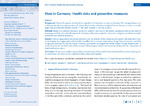Heat in Germany: Health risks and preventive measures
Winklmayr, Claudia
Matthies-Wiesler, Franziska
Muthers, Stefan
Buchien, Sebastian
Kuch, Bernhard
an der Heiden, Matthias
Mücke, Hans-Guido
Background: Climate change has already led to a significant temperature increase in Germany. The average temperature in the past decade was approximately 2°C above the pre-industrial level and eight of the ten hottest summers since the beginning of systematic weather records in 1881 were recorded in the last 30 years.
Methods: Based on a selective literature search and authors’ evaluations, the article summarises the current state of knowledge on heat and its health impacts for Germany, addresses adaptation measures, and gives an outlook on implementation and research questions.
Results: Heat can aggravate pre-existing conditions such as diseases of the cardiovascular system, the respiratory tract, or the kidneys and trigger potentially harmful side effects for numerous medications. A significant increase in mortality is regularly observed during heat events. Previous approaches to mitigate the health impact of high temperatures include, for example, the heat alerts of the German Meteorological Service and recommendations for the preparation of heat-health action plans.
Conclusions: Evidence on health impacts of heat and awareness of the need for heat-related health protection have grown in recent years, but there is still a need for further action and research.
This is part of a series of articles that constitute the German Status Report on Climate Change and Health 2023.
Files in this item

